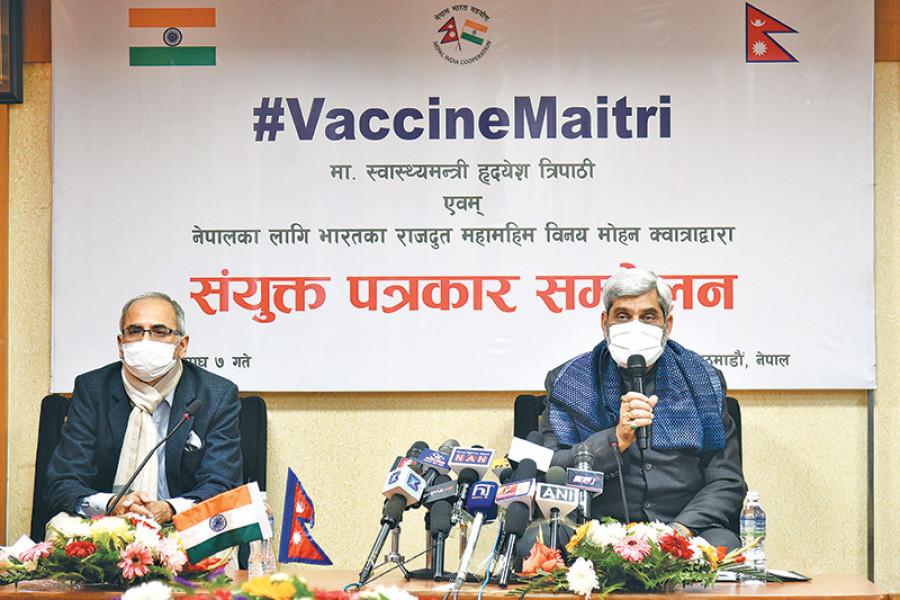
Peace and stability at the domestic, regional and global levels are closely related to the pursuit of the foreign policy of any country. Stability in the immediate neighbourhood or region is vital for any government to effectively and uninterruptedly promote its national interests and elevate its position in the global matrix. As Indian foreign policy analyst C Raja Mohan aptly puts it, “Without enduring primacy in one’s own neighbourhood, no nation can become a credible power at the global stage.”
The Modi government has very well comprehended the importance of cultivating and sustaining relations with its neighbouring countries. Since it assumed power in 2014, the Modi government has stressed the "Neighbourhood First" policy as an integral component of Indian foreign policy. The policy strives to build cordial and synergetic relations with its South Asian neighbours in various areas such as economy, science and technology, research and education, among others.
However, sustained stability has been a cause of concern for the South Asian region for a long time. In South Asia, persistent turmoil at the political, economic and social levels has continuously disturbed the peace and stability in India’s neighbouring countries and the region as a whole. Even today, the current situation in Afghanistan, Pakistan, Myanmar and Sri Lanka is marked by fragility.
Given the concerns about stability in the region with the neighbourhood embroiled in an ongoing problem, India’s role in crisis management is important. The question of stability, combined with the growing footprint of China to leverage the situation in its favour, requires India to develop a better management strategy to strengthen its goodwill by demonstrating its generosity and strategic capability in its neighbouring countries, which are relatively small in terms of geographical size and economic strength.
Neighbourhood First
India’s Neighbourhood First policy can also be seen as a manifestation of the Modi government’s vision of building a Vasudhaiva Kutumbakam (the world as one family). Vaccine diplomacy and development assistance based on mutual respect and equal partnership are two of the most important pillars to catapult India’s Neighbourhood First policy.
Vaccine diplomacy has been seen as a pragmatic response to the global pandemic and as a way to strengthen its image as a responsible leader at both regional and global levels. Noteworthy, Indian diplomacy, particularly during the Covid-19 pandemic, resulted in India being recognised on the world stage as a harbinger of hope providing necessary help to needy nations and their people globally. As part of India’s Neighbourhood First policy, India, through its vaccine diplomacy (Vaccine Maitri), extended help to many countries of the world and neighbouring countries during the Covid-19 pandemic. Also, and notwithstanding that India was affected very badly, particularly during the second wave, India handled the situation very well to overcome the worst effects of the pandemic relatively, and at the same time, help other countries to address the challenge.
The primary beneficiaries of Vaccine Maitri in the South Asian region are Bangladesh (INR22.5928 million in total supplies in the form of commercial and grant assistance, followed by Nepal (INR9.499 million supplies); Sri Lanka (INR1.2640 million); Afghanistan (INR1.4680 million); Bhutan (INR0.55 million) and Maldives (INR0.312 million). India also committed $10 million to the South Asian Association for Regional Cooperation (SAARC) Fund to address the global pandemic.
Keeping with the spirit of Vasudhaiva Kutumbakam, India is also providing all possible help to Afghanistan and Sri Lanka to address their myriad challenges through its development assistance initiative. It is worth mentioning that since the Taliban came to power in Afghanistan, India has supplied wheat and other essential food items and Covid-19 vaccines as humanitarian aid to Afghanistan. In its budget for 2022-23, India has allocated an amount of INR2,000 million as development assistance to Afghanistan.
The Indian government has allocated INR62,920 million in its budget for 2022-23 for development assistance to countries in India’s neighbourhood and Africa and Latin America. As part of the development assistance, the Indian government allocated INR22,660 million to Bhutan, INR7,500 million to Nepal, INR6,000 million to Myanmar, INR3,600 million to the Maldives, INR3,000 million to Bangladesh and INR2,000 million to Sri Lanka, respectively.
Considering the ongoing severe economic crisis in Sri Lanka, India has agreed to provide a line of credit of $1 billion to Sri Lanka. Further, India sent fuel to Sri Lanka to deal with the power crisis. Apart from this, India also helped Sri Lanka with the supply of food grain to address the shortage of essential food commodities.
Way ahead
India’s necessary help to South Asian countries by prioritising neighbouring countries in its pursuit of foreign policy objectives, particularly by extending help to Sri Lanka and Afghanistan in their time of crisis, is a testimony to India’s importance to its Neighbourhood First policy.
There are more reasons to push for the Neighbourhood First policy in the future: First, sustained engagement with the neighbouring countries will facilitate creating a cordial atmosphere in the region, which has been a constant impediment to establishing stability, trust and progress in the area. Stability will enable India to pursue its foreign policy goals and facilitate growth and development in other South Asian countries. Second, by extending necessary assistance, India can strengthen its position in the region and achieve both economic and strategic depth vis-à-vis China. Therefore, there is a greater need for sustained engagement with its neighbouring countries. Third, priority should be given to people-to-people connections and deep cultural affinities for sustained cordiality and stability. Further, focus should be given to prompt delivery of its commitments for the overall development of the region.













